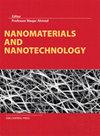纳米结构表面疏水性的新见解:实验和计算模型
IF 3.3
3区 材料科学
Q2 MATERIALS SCIENCE, MULTIDISCIPLINARY
引用次数: 9
摘要
本文综述了纳米结构表面疏水性的不同方面。本文探讨了理论效应和几何效应以及表面几何特征对疏水性的影响。本文综述了纳米材料的表面改性方法及其对表面疏水性的影响。有一小章专门讨论自组装单层作为一种特殊类型的纳米结构表面的疏水性。有一章专门讨论描述疏水性的不同模型。计算方法包括量子、密度泛函理论和分子模型,为纳米结构表面的疏水性研究带来了新的视角。图形抽象本文章由计算机程序翻译,如有差异,请以英文原文为准。
New insights into hydrophobicity at nanostructured surfaces: Experiments and computational models
This review deals with different aspects of hydrophobicity at nanostructured surfaces. Theoretical and geometric effects as well as those of surface feature geometry on hydrophobicity are explored in this article. This review includes surface modification methods used to change surface hydrophobicity and effect on adhesion of cells as nano substrate. A small chapter is devoted to hydrophobicity at self-assembled monolayers as a special type of nanostructured surface. To the different models describing hydrophobicity is devoted one up to dated chapter. Calculation methods including quantum, density functional theory, and molecular modeling bring novel perspectives to the study of hydrophobicity at nanostructured surfaces. Graphical Abstract
求助全文
通过发布文献求助,成功后即可免费获取论文全文。
去求助
来源期刊

Nanomaterials and Nanotechnology
NANOSCIENCE & NANOTECHNOLOGY-MATERIALS SCIENCE, MULTIDISCIPLINARY
CiteScore
7.20
自引率
21.60%
发文量
13
审稿时长
15 weeks
期刊介绍:
Nanomaterials and Nanotechnology is a JCR ranked, peer-reviewed open access journal addressed to a cross-disciplinary readership including scientists, researchers and professionals in both academia and industry with an interest in nanoscience and nanotechnology. The scope comprises (but is not limited to) the fundamental aspects and applications of nanoscience and nanotechnology
 求助内容:
求助内容: 应助结果提醒方式:
应助结果提醒方式:


